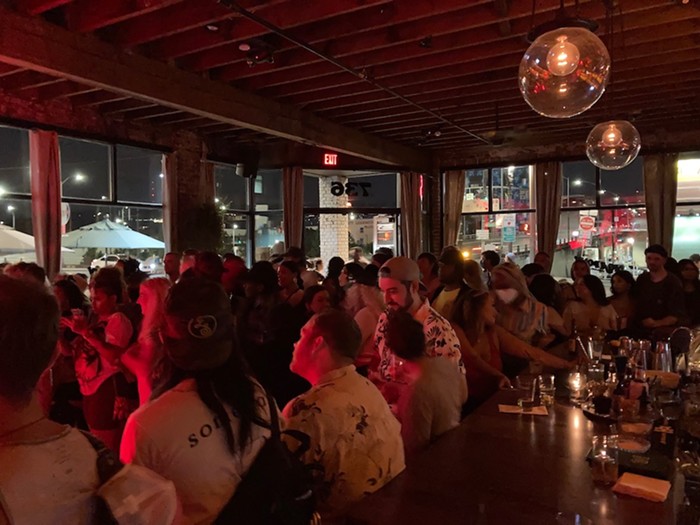I'M NOT in a band that has put out nine albums—some classic, some not—and scored hit songs on MTV. And I'm not in a band that's toured all over the world, earning both a fiercely loyal following and a legion of haters. But if I were, I imagine the idea of getting on a boat with a bunch of my hardcore fans for five days would make my skin crawl.
Lots of big-time bands probably feel that way. And maybe Weezer—frontman Rivers Cuomo, guitarist Brian Bell, drummer Pat Wilson, and bassist Scott Shriner—felt that way before the veteran pop-rock quartet boarded the inaugural Weezer Cruise in 2012. But it must've been enjoyable; the band organized another in February of this year, complete with a fan Q&A session, a Weezer game show, and a concert on a private island.
This year's trip may also have been a form of thanks from the band, since the 2012 cruise is being credited as the inspiration behind Weezer's new album, Everything Will Be Alright in the End, its first since 2010's Hurley, and its best since at least 2001's self-titled "Green Album"—and maybe even 1996's revered Pinkerton.
Shriner says that first cruise was an eye-opener for a band that had spent the previous three years cranking out albums that featured slick sounds, high-powered co-writers, and even a guest verse from Lil Wayne.
After the cruise, "It was like, 'Wow, that was cool. We were on this boat hanging out with all our fans and actually listening to what they wanted,'" Shriner says. "It's a really good bunch of people, and I think it just kind of [got us thinking], 'Oh, okay. Maybe we're not going to appeal to the masses. Maybe we're going to be who we are and appeal to the people that have already fallen in love with the band.'"
On the cruise, Weezer played shows dedicated to Pinkerton and the band's 1994 self-titled debut (the "Blue Album") and "re-sparked a connection with the old fans," says Shriner. The unusual venue also gave the band a chance to try out new tunes without fear they'd show up on YouTube within minutes.
"It kind of brought us back to an older style, I think," Shriner says.
When Weezer got back to land and started work on its ninth album, they hired the Cars' Ric Ocasek to produce, just as he had on the Blue and Green Albums. Ocasek's gift for blending melody with a "raw and honest" feel was a key factor in the new album's sound, which recalls the Weezer that made such a splash in the mid-1990s, Shriner says.
"When I listened to the isolated bass and drum tracks from this album... I could hear my actual performance in the song," he says. "And I haven't heard that in a Weezer record since [2002's] Maladroit."
To be clear, Everything Will Be Alright in the End doesn't reach the towering heights of Weezer's first two albums. But it gets a lot closer than most of what they've done since. "Ain't Got Nobody," "Back to the Shack," and "Da Vinci" all swing with the kind of chunky swagger that powered Pinkerton, while "Lonely Girl" and "Go Away" (a duet with Best Coast's Bethany Cosentino) sound like they descended from the same power-chord nirvana that birthed the Blue Album. Elsewhere, the choruses of "Eulogy for a Rock Band" and "I've Had It Up to Here" feature classic Cuomo melodies that are as comforting as they are familiar.
Lyrically, Cuomo's long-recurring themes of girl problems and father wounds are joined by worries of getting older, of becoming irrelevant, and ultimately, distaste for the current state of popular music. In "I've Had It Up to Here," he fears finding himself homogenized ("with as much edge as a balloon") and repels pandering to the masses. In "Back to the Shack," he plainly declares his intent: "Rockin' out like it's '94." (Longtime Weezer fans have learned to tolerate some of Cuomo's lyrics in the name of melody. The new album is no different.)
But it's more than just rockin' out like it's '94, says Shriner.
"I think Weezer is really just focusing on sounding like Weezer and being the best band we can be without being stagnant and just going, 'Okay, everybody dial it back 20 years and let's try to sound and play like we used to play,'" he says. "We've all grown a lot as people—our playing styles and our influences—so let's bring who we are today [while] keeping what makes Weezer great forefront in our mind.
"It's new Weezer," Shriner continues, "it's just trying to connect with what got us started."



















